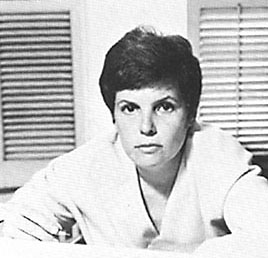A Quote by Virginia Woolf
But why do I notice everything? She thought. Why must I think? She did not want to think. She wanted to force her mind to become a blank and lie back, and accept quietly, tolerantly, whatever came.
Related Quotes
She didn't care anymore... and she got no pleasure from the work she did, but she did it. Everything bored her. She found that when she didn't have a notebook it was hard for her to think. The thoughts came slowly, as though they had to squeeze through a tiny door to get to her, whereas when she wrote, they flowed out faster than she could put them down. She sat very stupidly with a blank mind until finall 'I feel different' came slowly to her mind. Yes, she thought, after a long pause. And then, after more time, 'Mean, I feel mean.
I was amazed by this person who, even though she had everything, would go to feed the homeless and visit sick children and Aids victims. It was like a fairy tale. Who was she really? Why did she do this? She was trying to find love. I wanted the world to see her kindness, her humility: I think she realised that would be her way.
She glanced up at him, and in that moment he pulled his wet shirt over his head. She forced her mind blank. Blank as a new sheet of paper, blank as a starless sky. He came to the fire and crouched before it. He rubbed the water from his bare arms and flicked it in the flames. She stared at the goose and sliced his drumstick carefully and thought of the blankest expression on the blankest face she could possibly imagine. It was a chilly evening; she thought about that. The goose would be delicious, they must eat as much of it as possible, they must not waste it; she thought about that.
I wondered about Mrs. Winterbottom and what she meant about living a tiny life. If she didn't like all that baking and cleaning and jumping up to get bottles of nail polish remover and sewing hems, why did she do it? Why didn't she tell them to do some of the things themselves? Maybe she was afraid there would be nothing left for her to do. There would be no need for her and she would become invisible and no one would notice.
The doctor's wife wasn't a bad woman. She was sufficiently convinced of her own importance to believe that God actually did watch everything she did and listen to everything she said, and she was too taken up with rooting out the pride she was prone to feeling in her own holiness to notice any other failings she might have had. She was a do-gooder, which means that all the ill she did, she did without realizing it.
As he was about to leave, she said, "Murtagh." He paused and turned to regard her. She hesitated for a moment, then mustered her courage and said, "Why?" She though he understood her meaning: Why her? Why save her, and now why try to rescue her? She had guessed at the answer, but she wanted to hear him say it. He stared at her for the longest while, and then, in a low, hard voice, he said, "You know why.
People said things they didn't mean all the time. Everybody else in the world seemed able to factor it in. But not Lena. Why did she believe the things people said? Why did she cling to them so literally? Why did she think she knew people when she clearly didn't? Why did she imagine that the world didn't change, when it did? Maybe she didn't change. She believed what people said and she stayed the same." (Lena, 211)
One of my mentors was Patricia Schroeder, and one night she came to me on the floor and she said to me, "Why are we sitting in Congress, when a lot of women would try to do it and couldn't? Why are we here and others aren't?" And I thought back and said it was because my father believed in me and she said the same thing, she said her father believed in her and thought she could do anything.
Think about the number of times someone will say to herself, "I want to get out of this circumstance, but I'm too afraid. I'll lie about how happy I am in this marriage, and I'll put up a front." But she's betraying everything that's in her heart. She's making choices that are harming her, and that's why she's hurting. Her intuition is trying to tell her that.
How was it that he haunted her imagination so persistently? What could it be? Why did she care for what he thought, in spite of all her pride in spite of herself? She believed that she could have borne the sense of Almighty displeasure, because He knew all, and could read her penitence, and hear her cries for help in time to come. But Mr.Thornton-why did she tremble, and hide her face in the pillow? What strong feeling had overtaking her at last?
But what I kept wondering about is this: that first second when she felt her skirt burning, what did she think? Before she knew it was candles, did she think she'd done it herself? With the amazing turns of her hips, and the warmth of the music inside her, did she believe, for even one glorious second, that her passion had arrived?
She suddenly understood why she had let him kiss her in the diner, why she had wanted him at all. She wanted to control him. He was every arrogant boyfriend that had treated her mother badly. He was every boy that told her she was too freaky, who had laughed at her, or just wanted her to shut up and make out. He was a thousand times less real than Roiben.
My mother wanted to be a mother. That's the only thing she wanted from the bottom of her heart. She didn't want to be the number one actress - which she was - and she didn't want to be this great legend. All she wanted to be was a mother and she did but God took her away. So I always will empathise and sympathise with women.
For hours she danced and sang and flirted and did this thing that's-she did Marilyn Monroe. And then there was the inevitable drop. And when the night was over and the white wine was over and the dancing was over, she sat in the corner like a child, with everything gone. I saw her sitting quietly without expression on her face, and I walked towards her but I wouldn't photograph her without her knowledge of it. And as I came with the camera, I saw that she was not saying no.


































